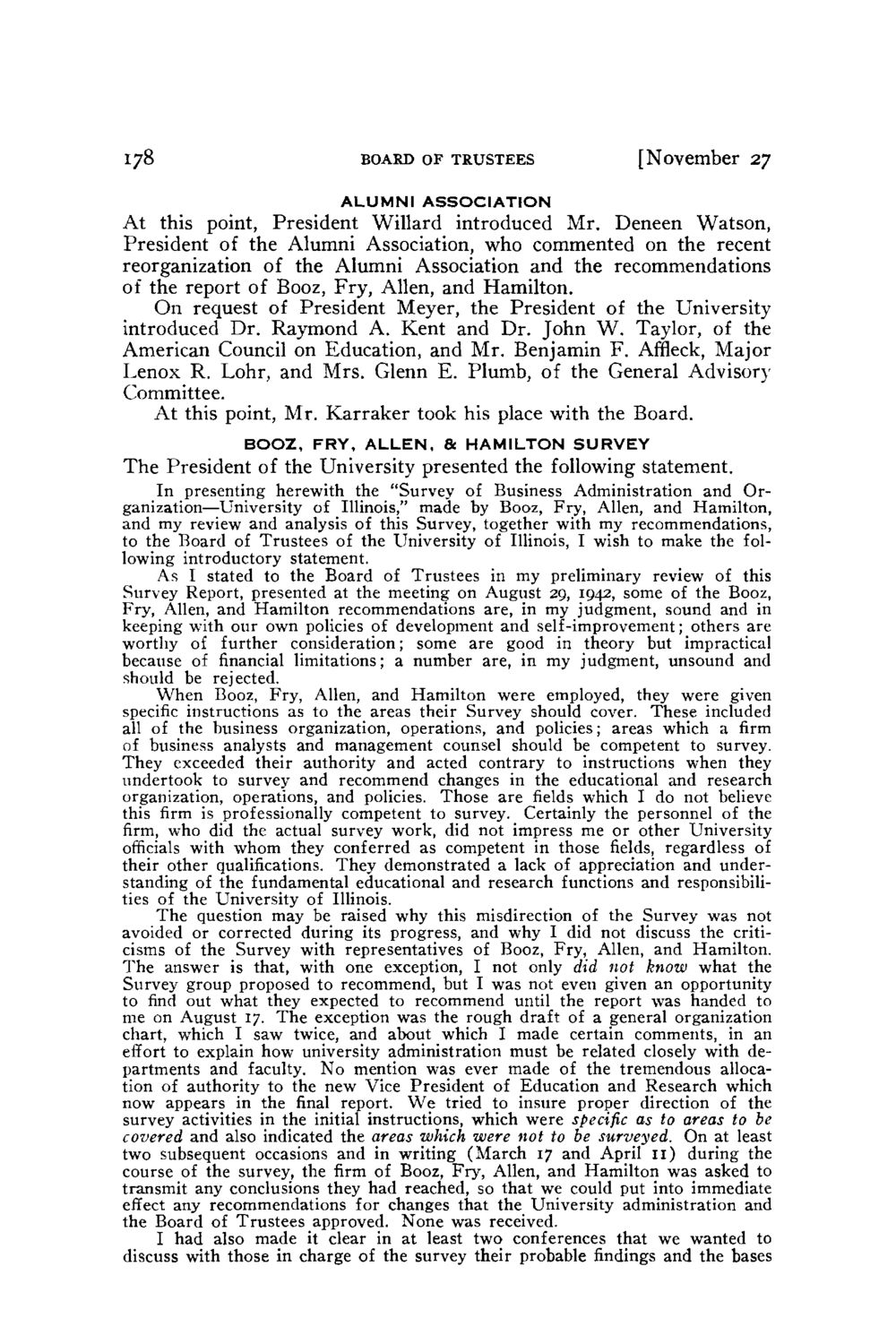| |
| |
Caption: Board of Trustees Minutes - 1944
This is a reduced-resolution page image for fast online browsing.

EXTRACTED TEXT FROM PAGE:
i78 BOARD OF TRUSTEES ALUMNI ASSOCIATION [November 27 At this point, President Willard introduced Mr. Deneen Watson, President of the Alumni Association, who commented on the recent reorganization of the Alumni Association and the recommendations of the report of Booz, Fry, Allen, and Hamilton. On request of President Meyer, the President of the University introduced Dr. Raymond A. Kent and Dr. John W. Taylor, of the American Council on Education, and Mr. Benjamin F. Affleck, Major Lenox R. Lohr, and Mrs. Glenn E. Plumb, of the General Advisory Committee. At this point, Mr. Karraker took his place with the Board. BOOZ, FRY, A L L E N , & HAMILTON SURVEY The President of the University presented the following statement. In presenting herewith the "Survey of Business Administration and Organization—University of Illinois," made by Booz, Fry, Allen, and Hamilton, and my review and analysis of this Survey, together with my recommendations, to the Board of Trustees of the University of Illinois, I wish to make the following introductory statement. As I stated to the Board of Trustees in my preliminary review of this Survey Report, presented at the meeting on August 29, 1942, some of the Booz, Fry, Allen, and Hamilton recommendations are, in my judgment, sound and in keeping with our own policies of development and self-improvement; others are worthy of further consideration; some are good in theory but impractical because of financial limitations; a number are, in my judgment, unsound and should be rejected. W h e n Booz, Fry, Allen, and Hamilton were employed, they were given specific instructions as to the areas their Survey should cover. These included all of the business organization, operations, and policies; areas which a firm of business analysts and management counsel should be competent to survey. They exceeded their authority and acted contrary to instructions when they undertook to survey and recommend changes in the educational and research organization, operations, and policies. Those are fields which I do not believe this firm is professionally competent to survey. Certainly the personnel of the firm, who did the actual survey work, did not impress me or other University officials with whom they conferred as competent in those fields, regardless of their other qualifications. They demonstrated a lack of appreciation and understanding of the fundamental educational and research functions and responsibilities of the University of Illinois. T h e question may be raised why this misdirection of the Survey was not avoided or corrected during its progress, and why I did not discuss the criticisms of the Survey with representatives of Booz, Fry, Allen, and Hamilton. T h e answer is that, with one exception, I not only did not know what the Survey group proposed to recommend, but I was not even given an opportunity to find out what they expected to recommend until the report was handed to me on August 17. T h e exception was the rough draft of a general organization chart, which I saw twice, and about which I made certain comments, in an effort to explain how university administration must be related closely with departments and faculty. N o mention was ever made of the tremendous allocation of authority to the new Vice President of Education and Research which now appears in the final report. W e tried to insure proper direction of the survey activities in the initial instructions, which were specific as to areas to be covered and also indicated the areas which were not to be surveyed. On at least two subsequent occasions and in writing (March 17 and April n ) during the course of the survey, the firm of Booz, Fry, Allen, and Hamilton was asked to transmit any conclusions they had reached, so that we could put into immediate effect any recommendations for changes that the University administration and the Board of Trustees approved. None was received. I had also made it clear in at least two conferences that we wanted to discuss with those in charge of the survey their probable findings and the bases
| |